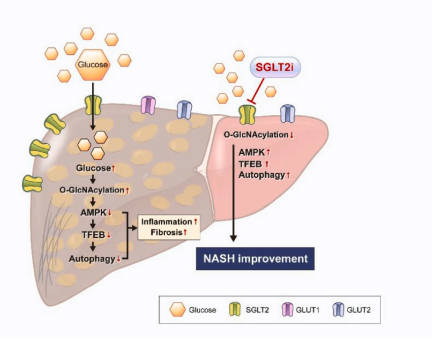Researchers at Yonsei University College of Medicine (YUCM) have found that SGLT-2 inhibitors, commonly prescribed to diabetes patients, are effective in reducing the symptoms of non-alcoholic steatohepatitis (NASH).

Non-alcoholic fatty liver disease (NAFLD) occurs due to the accumulation of fat in the liver, which can lead to NASH, whereby the accumulated fat accumulates in the liver and can cause damage and inflammation.
Patients suffering from NASH have up to a 29 percent chance of developing cirrhosis within 10 years which can subsequently increase the risk of liver cancer up to 27 percent.
Despite being a common liver disease, accounting for 20 percent of the world's population, there are no FDA-approved treatments.
The study led by Professors Cha Bong-soo, Lee Yong-ho, and Lee Min-young of YUCM’s Internal Medicine Department and Professor Han Dai-hoon of YUCM’s Surgery Department analyzed human liver tissues from 29 patients with NASH and 15 patients without NAFLD who underwent liver resection for liver cancer or cholecystectomy from 2015 to 2019 at Severance Hospital.

They found that liver samples with NAFLD had increased levels of SGLT-2, a protein that transports sugar into cells and binds the sugar to cells.
The team hypothesized that SGLT-2 inhibitors, a diabetes drug that lowers blood sugar, would reduce excess sugar uptake into liver cells and thus alleviate NASH.
The results were also confirmed in mice models with NAFLD.
Additionally, the mice showed a decrease in the ability of liver cells to filter their cellular waste and a broader range of liver inflammation. The researchers attributed this to additional sugar binding to the proteins responsible for autophagy, making them less effective.
Subsequent treatment with an SGLT-2 inhibitor reduced SGLT-2 expression and sugar-bound proteins in the mice's liver, restored hepatocyte autophagy, and alleviated the inflammatory response which demonstrate the recovery of NASH symptoms.
"This is the first study to provide medical evidence and mechanisms that SGLT-2 inhibitors for diabetes relieve the symptoms of NASH," said Professor Cha. "We expect to improve the prognosis of NAFLD, the prevalence of which is increasing with the recent rise in metabolic diseases such as diabetes, and prevent its deterioration into cirrhosis and liver cancer."
The results were published in the latest issue of the Metabolism journal on Jun. 3.
Related articles
- ‘Smoking poses cardiovascular risks to cancer survivors’
- Severance's new Aortic Center aims to detect cardiac diseases in 'golden time'
- Korea’s 1st heavy particle therapy performed on prostate cancer patient
- Statin-ezetimibe combo proves superior to monotherapy in high-risk atherosclerosis patients
- Daewoong seeks to conduct phase 3 study on Envlo combo to treat diabetes

